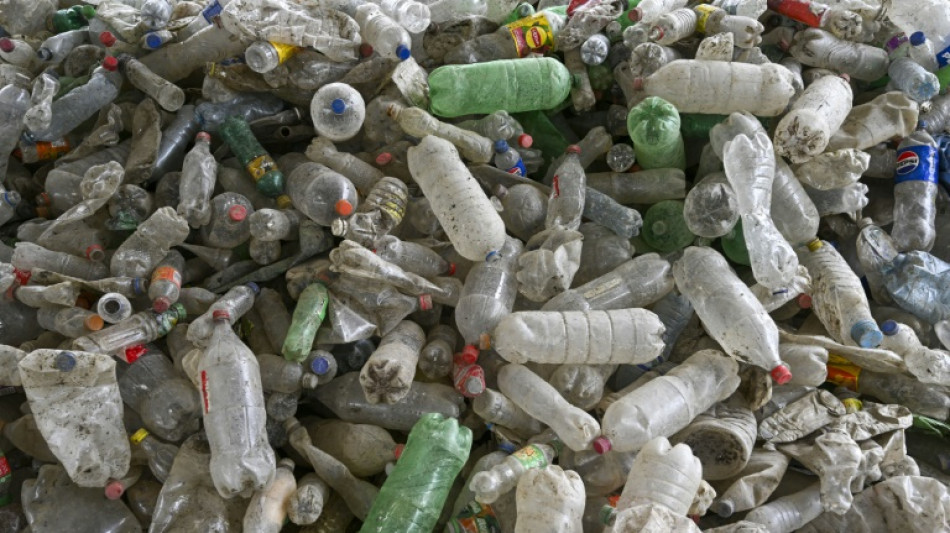
Talks for landmark plastic pollution treaty grind on

Talks on sealing a landmark treaty to tackle the global scourge of plastic pollution were still stuck in second gear on Monday, with time running out to bridge the chasm between the most ambitious countries and oil-producing states.
Plastic pollution is so commonplace that microplastics have been found on the highest mountain peaks, in the deepest ocean trench and scattered throughout almost every part of the human body.
The 184 countries meeting at the United Nations in Geneva have little more than three days left to reach an agreement.
One African negotiator predicted the talks would conclude with a treaty by Thursday's deadline, even if it did not contain very much.
"We haven't worked for three years to come away with nothing," they told AFP.
Some countries held informal talks on Sunday's nominal day off to try to get things moving -- but nothing emerged that paved the way for a game-changing shift on Monday.
- Eyes on Tuesday -
The first week of talks fell behind schedule and failed to produce a clear text, with states deeply divided at square one: the purpose and scope of the treaty they started negotiating two and a half years ago.
Another diplomat said some informal discussions on the sidelines were now "moving very fast" and could produce answers that could then go forward for formal agreement.
The talks have focused on topics ranging from the design of plastic to waste management, production, financing for recycling, plastic reuse, and funding waste collection in developing countries.
They also discussed molecules and chemical additives that pose environmental and health risks.
- The rival camps -
A cluster of mostly oil-producing states calling themselves the Like-Minded Group -- including Saudi Arabia, Kuwait, Russia, Iran, and Malaysia -- want the treaty to focus primarily on waste management.
The United States and India are also aligned with this club.
On the opposite side, a growing faction calling themselves the "high ambition" coalition want more fundamental action written into the treaty.
Specifically, they seek to rein in plastic production, which on current trends is set to triple by 2060. This grouping also wants to phase out certain especially toxic chemicals.
The European Union, many African and Latin American countries, Australia, Britain, Switzerland and Canada all fall within this fold, as do small island states drowning in plastic trash they did not produce and cannot prevent from lapping up on their shores.
"Pollution in our islands is so pernicious and evident every single day in our oceans, in our waterways," Matthew Wilson, Barbados's ambassador to the UN in Geneva, told AFP.
"We do not have the waste management and recycling facilities in very small islands, it's very expensive". Instead, much goes to a landfill on islands with limited space.
"We need global solutions to a shared global problem."
- 800 Eiffel Towers -
France's Ecological Transition Minister Agnes Pannier-Runacher said the treaty would have to be legally-binding, and address all stages of plastic's life cycle.
"Every minute, 15 tonnes of plastic are released into the ocean worldwide, or nearly eight million tonnes per year! That's nearly 800 times the weight of the Eiffel Tower!" she said on X.
"Complacency and a laissez-faire attitude can no longer be an option."
The treaty is set to be settled by universal consensus but with countries far apart, observers said the lowest-ambition countries are comfortable not budging.
Claire Arkin, spokeswoman for the Global Alliance for Incinerator Alternatives, told AFP: "By calling for a vote, it would make this minority of countries who block the whole process realise they would lose it -- and force them to make compromises."
F.Cabrera--HdM

 London
London

 Manchester
Manchester
 Glasgow
Glasgow
 Dublin
Dublin
 Belfast
Belfast
 Washington
Washington
 Denver
Denver
 Atlanta
Atlanta
 Dallas
Dallas
 Houston Texas
Houston Texas
 New Orleans
New Orleans
 El Paso
El Paso
 Phoenix
Phoenix
 Los Angeles
Los Angeles



